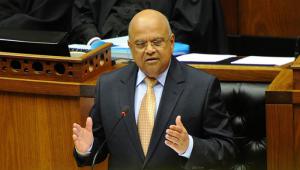By Nick Mann | 13 March 2013
South Africa’s high government debt leaves it vulnerable to future economic shocks unless the country sticks to spending measures agreed in the budget, finance minister Pravin Gordhan warned yesterday.
Gordhan told the Parliament that the country had reduced its public debt substantially during the mid-2000s, giving it space to spend in response to the global economic crisis. But increasing deficits and a slow economic recovery had now ‘eroded’ its debt position relative to its peers.
‘This has a number of negative consequences for South Africa’, he explained. ‘First, it means that we are vulnerable in the event that economic circumstances take a turn for the worse. The fiscal space available to us is narrower.
‘Second, high levels of government debt put upward pressure on interest rates and can have other effects which undermine growth and investment in the economy. Third, rising debt inevitably leads to rising debt service costs.‘
South Africa’s interest payments are forecast to be the fastest growing item of government spending over the next three years, Gordhan said. In 2015/16, it will spend R118bn on servicing its debt – more than the R80bn budget for police services that year or the R96bn earmarked for health care workers’ salaries.
The measures outlined in last month's 2013 budget put the country on the path to ‘stabilisation’ by reducing deficits, Gordhan explained. The budget deficit crept up to 5.2% of gross domestic product in 2012/13 but is now subject to spending ceiling for the next three years. Net debt is forecast to peak at just above 40% of GDP in 2015/16.
‘Rebuilding the fiscal space we had achieved before the recession will require us to continue along a path of moderate growth in spending,’ Gordhan said yesterday. ‘It also means that structural increases in spending – for instance as a result of new policy reforms such as the introduction of a national health insurance scheme – would require concomitant increases in revenue.’
While the government’s commitment to restoring economic growth was ‘resolute’, the narrowing fiscal space meant it would have to do ‘more with less’, Gordhan added. ‘The key contribution that government will make in the years ahead is through an improvement in the quality of our spending.
‘Improving the impact of public spending by prioritising capital investment, and reducing waste and inefficiency, will be key.’












